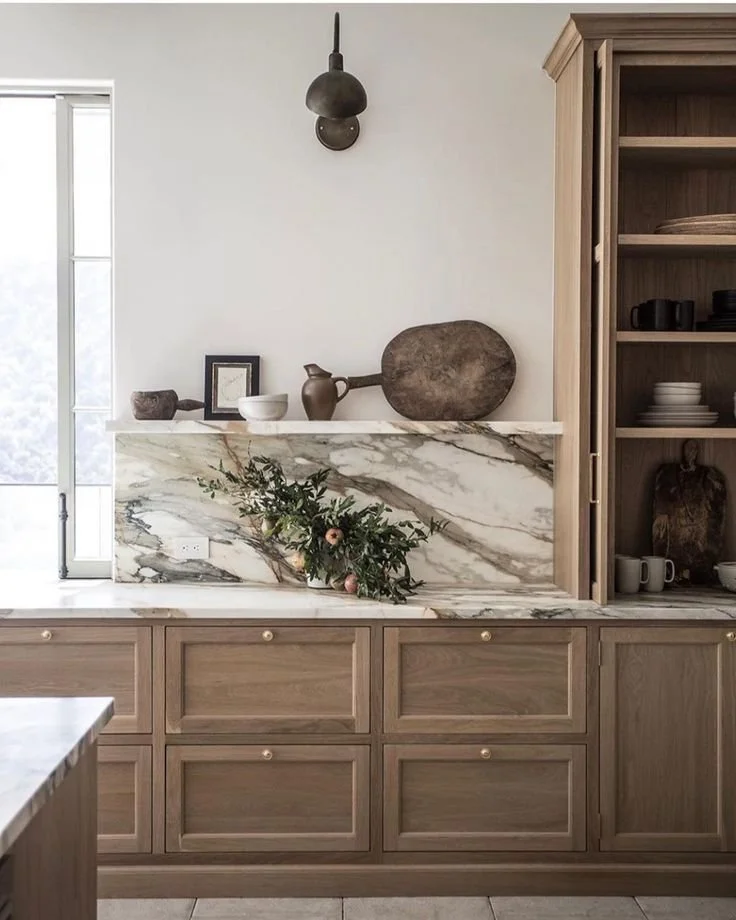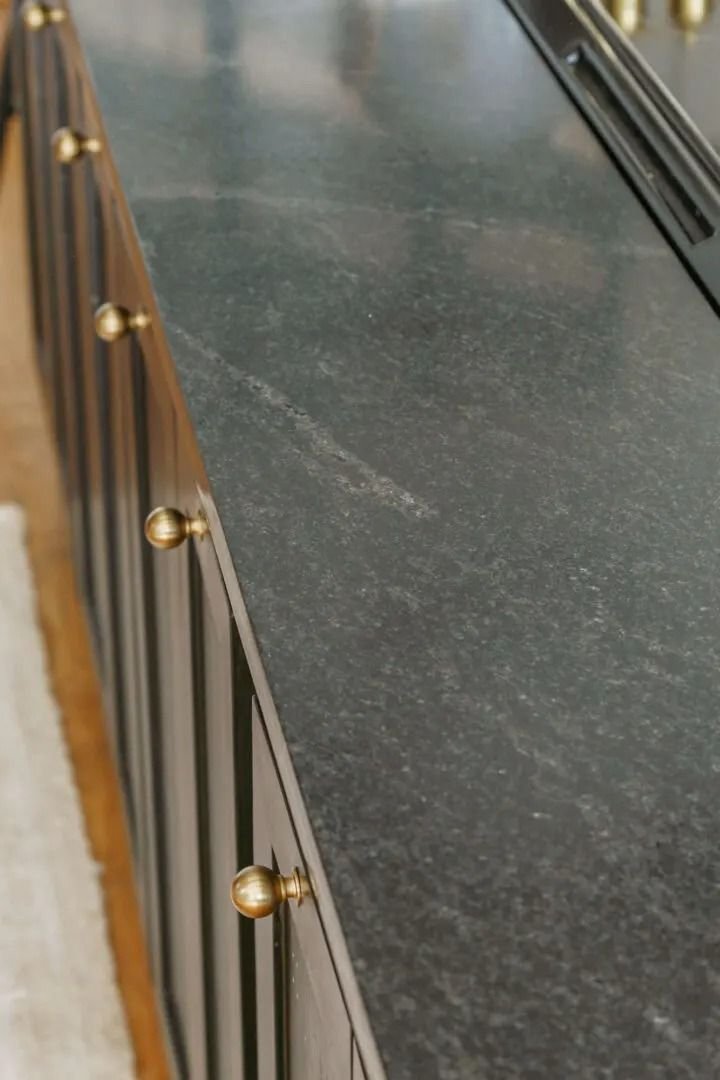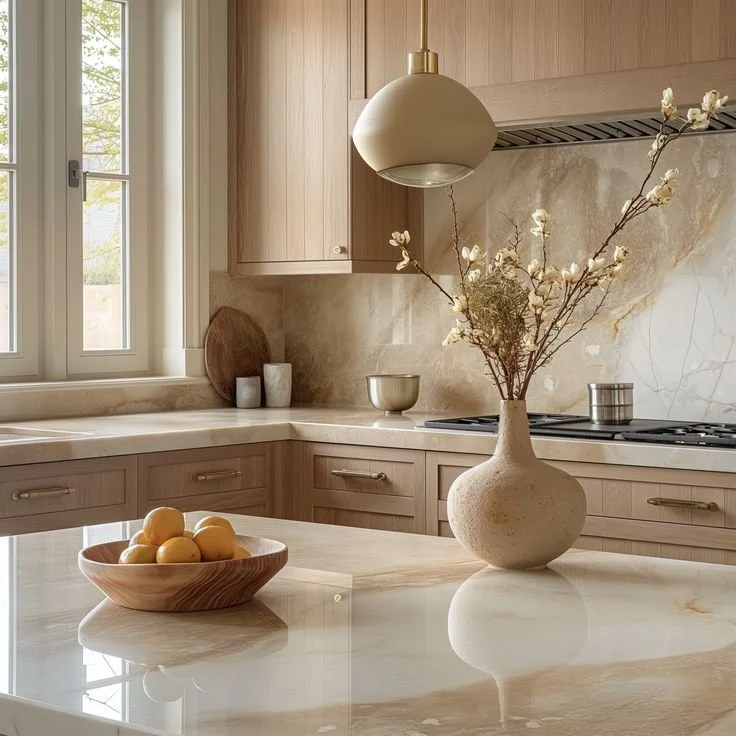EXCLUSIVE CONTENT
Complimentary Content and Design Support for Instagram Followers!
YOUR DESIGNER
Paige Gray, BA ID
Marble Countertops
Overview:
Marble is a natural stone that has been used in architecture and design for thousands of years. Known for its luxurious appearance, marble countertops are prized for their elegance and timeless appeal. The veins and patterns in marble are unique, making each piece one-of-a-kind.
Characteristics:
Appearance: Smooth, glossy finish with unique veining patterns in white, grey, or colored hues.
Origin: Natural stone, formed from limestone and subjected to heat and pressure.
Color Options: Primarily white with varying veins of grey, black, gold, or even green.
Pros:
Aesthetic Appeal: Marble is considered the gold standard for luxury and beauty. It adds sophistication to any space.
Heat Resistance: Marble is naturally heat resistant, making it ideal for kitchen spaces where hot pots or pans are often used.
Increased Home Value: High-end appeal can increase the resale value of a home.
Cons:
Stains Easily: Marble is highly porous, meaning it can absorb liquids like wine, coffee, and oil, leading to stains.
Scratches and Etching: Because it’s relatively soft, marble is prone to scratching and etching from acidic substances (like lemon or vinegar).
Maintenance: Regular sealing is needed to protect the surface from stains and damage. It requires more upkeep than other materials.
Best For:
Luxury spaces like bathrooms, kitchens, and areas where aesthetics take precedence over maintenance.
Granite Countertops
Overview:
Granite is another natural stone, known for its durability and unique patterns. It’s often used for kitchen countertops because of its hard surface and ability to withstand the wear and tear of daily life.
Characteristics:
Appearance: A wide range of colors, from neutrals like beige and grey to bolder hues like red, green, or blue. The surface typically has visible grains or specks.
Origin: Formed from cooled and solidified magma, granite is extremely dense and durable.
Color Options: Many options including earth tones, speckled designs, and even some more vibrant choices.
Pros:
Durability: Granite is one of the most durable materials, resistant to scratches, heat, and stains when properly sealed.
Low Maintenance: Once sealed, granite countertops are relatively low-maintenance and easy to clean.
Variety: Available in a wide range of colors and patterns, giving homeowners plenty of options.
Cons:
Sealing Required: Granite countertops need to be sealed periodically to prevent stains, though they are less porous than marble.
Price: High-quality granite can be expensive, especially for rarer colors or patterns.
Weight: Granite is very heavy, so proper support and installation are essential.
Best For:
High-traffic kitchens and bathrooms, especially in homes where durability is important.
Quartz Countertops
Overview:
Quartz countertops are engineered stone surfaces, made by combining natural quartz crystals with resins and pigments. They’re one of the most popular choices due to their combination of beauty, durability, and low maintenance.
Characteristics:
Appearance: Consistent patterns and colors, from marble-look designs to solid colors. Quartz can mimic the appearance of marble or granite but with more control over the design.
Origin: Engineered, not natural, made from around 90-95% natural quartz crystals mixed with resins and colorants.
Color Options: Wide variety of colors and patterns, including options designed to replicate marble, granite, or even solid, uniform looks.
Pros:
Durability: Quartz is highly durable, resistant to scratches, stains, and chips.
Low Maintenance: Unlike natural stone, quartz does not require sealing, and cleaning is easy with just soap and water.
Consistency: Because quartz is engineered, it offers a more consistent appearance without the natural imperfections found in marble or granite.
Non-porous: Unlike marble and granite, quartz does not absorb liquids, making it resistant to stains from oils, wine, or coffee.
Cons:
Heat Sensitivity: Quartz is less heat resistant than granite or marble. Hot pans should not be placed directly on the surface.
Artificial Look: While quartz can mimic natural stones, it may lack the authenticity and uniqueness of marble or granite.
Price: While generally less expensive than marble, high-end quartz can still be on the pricier side, though it is typically more affordable than luxury granite.
Best For:
Busy families, modern kitchens, and bathrooms where practicality, cleanliness, and low maintenance are top priorities.




